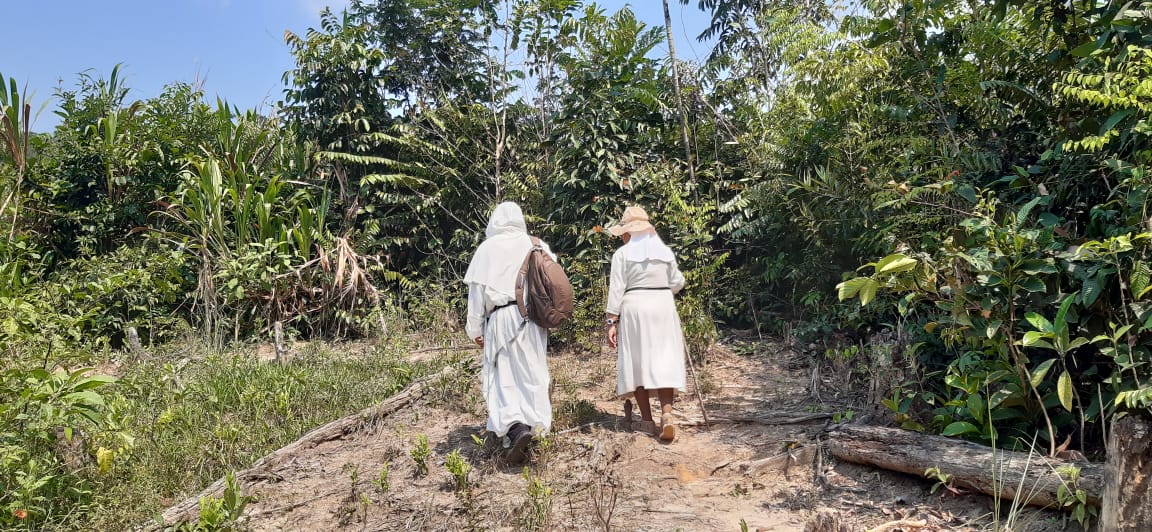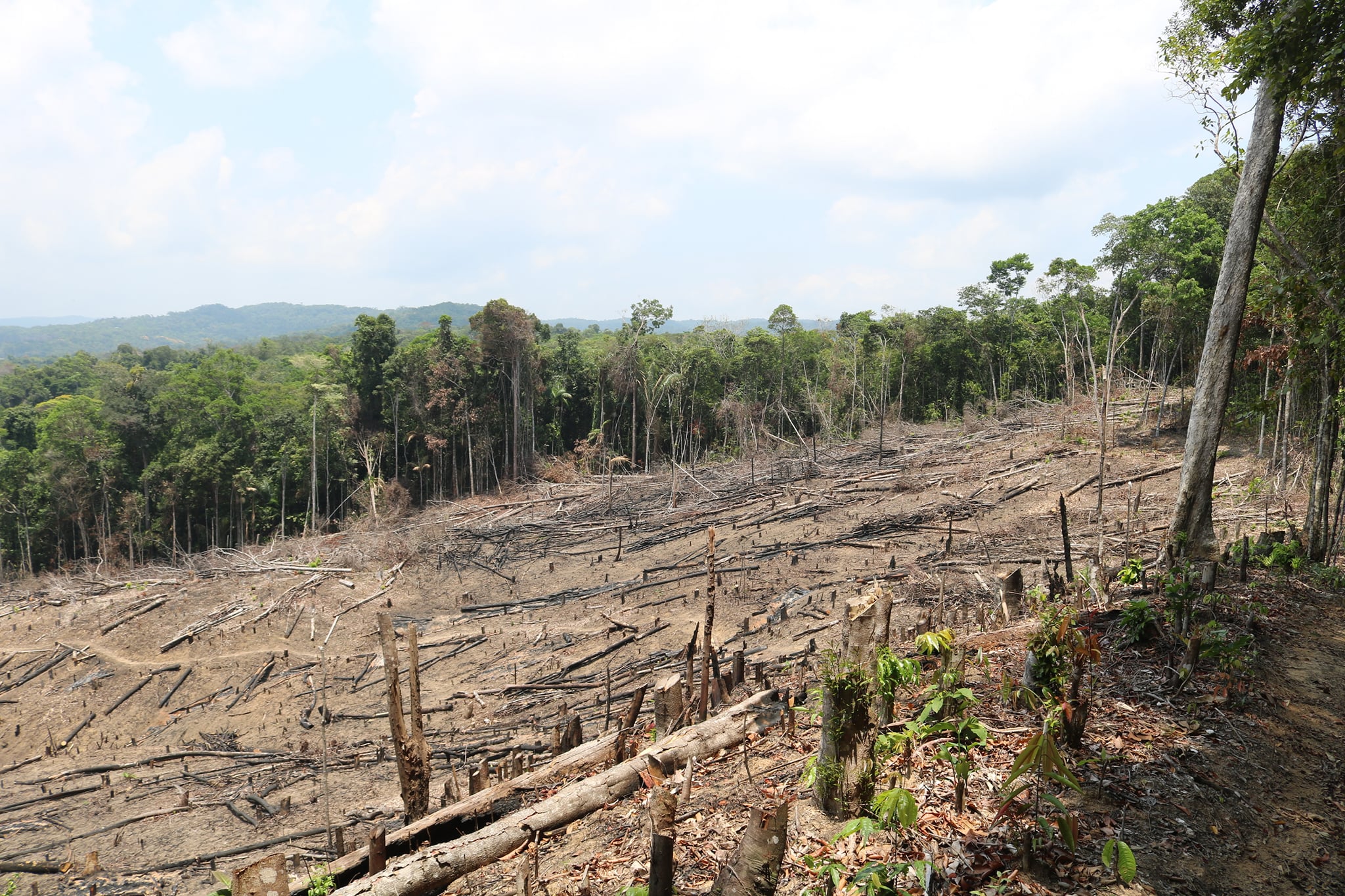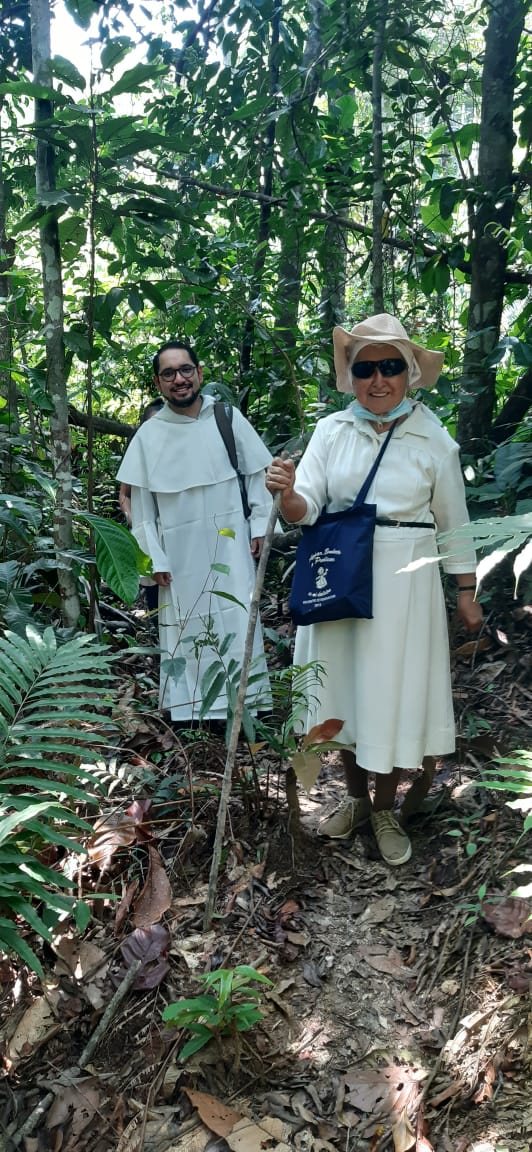Catatumbo Region (Colombia), 06/04/2021, Sr. Maria Eugenia Ardila Rueda, OP. and Fr. Jhonny Ochoa, OP.- According to the article on the website responsabilidadsocial.net, the environment is a system formed by natural and artificial elements that are interrelated and that are modified by human action, that conditions the way of life of society and that includes natural, social and cultural values that exist in a given place and at a given time (CSR Articles).
The United Nations (UN) established World Environment Day in its resolution of December 15, 1977. It had already been celebrated since 1974 on June 5, the date that marked the beginning of the Stockholm Conference in 1972, whose central theme was the environment.
THE CATATUMBO
 Sr. Ana Cecilia Villabona, Dominican Sister of the Presentation and Bro. Gerardo OP, visit to the village of La Selva
Sr. Ana Cecilia Villabona, Dominican Sister of the Presentation and Bro. Gerardo OP, visit to the village of La Selva
The mission carried out by the Sisters of the Presentation in the Catatumbo area has allowed them to see in a clearer and cruder way, in the midst of the mission they carry out there, how the different ecosystems are treated in this area. These lands, due to their environmental, agricultural and ecological characteristics, are ideal for the development of a diversity of crops, such as cocoa, banana, yucca, traditional corn, sugar cane, coffee, tomato and other basic products of the family basket, as well as hydrocarbon wealth, which is what should generate fees for this region but due to corruption issues this is not evident.
However, the natural wealth that characterizes the entire region has been stained by countless conflicts, socio-environmental conflicts that have been intensifying in recent years, the history of violence, the extraction of natural resources, illicit economies and agribusiness initiatives such as oil palm monocultures, have generated negative damage to the natural environment which sustains the communities, the relationship between man and the environment has been fractured and the wounds of the land are increasingly deeper, more deaths, more forced displacements.
The large extensions of coca crops, and the consolidation of a coca culture has led the farmers to justify the cultivation, because of the real impossibilities they have to survive in terms of food security, and many other unsatisfied basic needs, the poverty to which they have been driven by the exclusion and marginalization of the state, the impact of the war generated by the various armed groups outside the law and the government itself.
Because of this, we see today with pain the environmental devastation, such as the indiscriminate felling of trees, the burning of native forests, the reduction of water sources, the contamination of these with the waste from the processing of coca base, and the loss of peasant identity, and human lives, in addition to a constant narco-trafficking and paramilitary mentality.
 Catatumbo's Jungle village
Catatumbo's Jungle village
The reality that we live today was not strange to Jesus.
The parable of the murderous vinedressers[1] is an echo of today's violence for this ecological approach; it is a violent text, of difficult interpretation (Mk 12, 1-12). The parable connects in its conflictive and violent situation with the vineyard of Naboth in 1 Kings 21:1-16. There we have clearly the historical perspective as an expression of the conflict of the Land in the people of Israel whose emblematic text is that of the vineyard of Naboth. A farmer has a vineyard that he has inherited from his ancestors, paradoxically next to the palace of the king, who uses all means to appropriate it. The farmer is seduced with offers of exchange and purchase, but he does not yield to the king's pretensions and is killed.
In the parable of the Gospel of Mark, the conflictive plot of a vineyard is narrated, which has some interesting characteristics in the opposite sense to the vineyard already mentioned, because in the Ancient Testament text the violence is unleashed from the political, economic and religious powers of the monarchy against the life of Naboth, the legitimate heir of the vineyard. This conflictive dialectic written in the bible is the same that happens today in the Latin American, Caribbean, Catatumbo and Amazonian fields, designed against the indigenous, Afro-descendant and farmer communities and against our Mother Earth. Obviously, the historical account is written from the point of view of the peasant Naboth. On the other hand, in the parable of the "murderous vinedressers", according to the canonical text of Mark, the vineyard belongs to a man, who surrounds it with a fence, builds a place to make wine, builds a tower, rents it to some vinedressers and goes on a journey. The violent and murderous plot follows on behalf of the tenants against the lives of the servants and the son of the owner of the vineyard.
Clearly, the narration is presented from the point of view of the owner of the vineyard and against the laborers. Behind the narrative, one part of the conflict is made visible, but the other part is hidden, which must be sought by means of socio-historical reconstruction, since the biblical text does not offer clear possibilities to do so. What is visible is an extremely violent scenario where the laborers have the instruments to repress and kill the lord's servants and even their own son. The Greek version (La Cueva, 1990, p. 191-192) describes the death of several servants and the son, as well as that of the laborers by the lord. In this logic, the force of the lord ends up imposing itself, killing the laborers and handing over the vineyard to others. The allegory has shifted the conflict to other levels, transferring a conflict of land, patrons and vinedressers to another of religious and theological type where the interpretation in favor of the lord and against the laborers fits perfectly, although both were involved in violent and homicidal actions. Visit to the village of La Selva
Visit to the village of La Selva
David Castillo (2019), making a study of the parable, raises another point of view.
The vinedressers of the text are not so wicked when the parable is read from the reality of the latifundia, the tenure and rent of the land, the violence to possess it, and the theological discourse that legitimizes it. From there the parable is a window into a world where economic and social inequality has reached scandalous levels, and where land - the source of daily sustenance and socio-religious identity - is an element in violent dispute. (Castillo, 2019, p. 3) (Aníbal Cañaveral).
APPLICATION TO THE CONTEXT
Today in Catatumbo, the owners of the land are the large landowners, the governments, in turn, the armed groups, who without caring, displace, kill, massacre in order to take possession of the land of the native peasants, who have worked it for years, these landowners seek to take it over to fence it, cut it down, burn it, regardless of the impact on it, in order to achieve their Machiavellian purposes in favor of them. Today there are millions of displaced vine growers killed, massacred, in Catatumbo.
According to the number of murders of environmental leaders and land defenders, Colombia ranks 2nd among 22 countries, according to data from a recent report by an English NGO, Global Witness, which keeps track of the number of murders of environmental leaders and land defenders (Calle, 2019, prr. 1). We see then a very uncertain and difficult panorama in these territories and in general in Colombia. The work developed by the sisters has promoted leaders who work from the ethical basis of Christianity, and it is these leaders who are persecuted by the interests of those who lead the plundering and mismanagement of the environment.
The recent encyclical of Pope Francis, Laudato Si, denounces the various ways in which humanity is being murdered: "Some forms of pollution are part of people’s daily experience. Exposure to atmospheric pollutants produces a broad spectrum of health hazards, especially for the poor, and causes millions of premature deaths." (Francis, 2019, LS no.20).
[1] https://core.ac.uk/download/pdf/235209433.pdf The ecology that nests and throbs in Jesus' parables. CAÑAVERAL. Aníbal P. 156.


 EN
EN  ES
ES  FR
FR 



